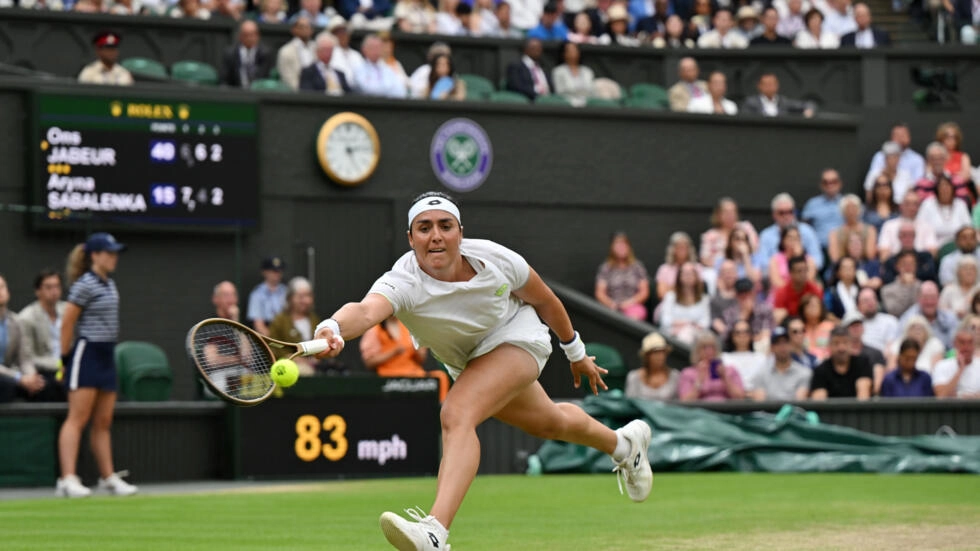Tunis (AFP) – Ons Jabeur hopes Saturday’s Wimbledon final will be a game-changer: at the third time of asking she is bidding to become the first African or Arab woman to win a Grand Slam singles title.

The 28-year-old Tunisian takes on Marketa Vondrousova of the Czech Republic, hoping to go one better than last year when Elena Rybakina beat her in the final at the All England Club.
Jabeur continues to push the limits, despite a sometimes difficult period following a series of injuries.
A national hero at home in Tunisia, the world number six has had a tough run to reach the final at Wimbledon, but she will emerge on court as the favourite against the unseeded Vondrousova.
Her rise to the top ranks of women’s world tennis was not the easiest.
Born in 1994 in Ksar Hellal, the youngest of four siblings began her career as a child on hotel tennis courts in the resort town of Hammam Sousse at the age of three.
By the time she was 10, she told her mother that one day she would “drink a coffee at Roland Garros”, home of the French Open, according to her first coach, Nabil Mlika.
“And so she did. It’s magical,” he told AFP.
At the age of 12, she joined a sports academy in the capital Tunis.
In 2011, in the middle of the Tunisian “Arab Spring” revolution, Jabeur won the Roland Garros junior tournament at the age of 16.
Ons Jabeur was well on her way.
Fighting spirit
According to Hichem Riani, the former technical director of the Tunisian tennis federation, Jabeur was always “dynamic, friendly and sociable, with a great sense of humour”.
Omar Laabidi, her hitting partner when she was a teenager, says she always showed a fighting spirit.
“What you see of Ons on the court, the warrior, the fighter who battles for every point, that’s always been her character,” he said.
Jabeur has the ability to bounce back from adversity, a talent she tends to put to good use.
In 2020, she was the first player from the Arab world to reach the Australian Open quarter-finals.
And last year at Wimbledon she went all the way to the final only to suffer heartbreak.
Jabeur always says she wants to make Tunisia proud, and after her win in the semi-final on Thursday she said she could not afford to take her eye off the ball.
Wimbledon now has a Facebook page in Arabic, with quotes from Jabeur and also poetry extolling green countryside in the North African country, a counterpart to the vibrant colour of the courts in London.
“Wimbledon reminds me of a wedding. I love the history and the traditions, like the all-white kit and everybody eating strawberries,” she wrote in a column for the BBC column last year.
At home, former playing partners Mehdi Abid and Moez Bougatya, remember a little girl who liked to train with the boys, having dominated the local girls’ game.
‘Going full in’
“Once she took part in a boys’ tournament and won matches, which demoralised some of the players who were upset to be beaten by a girl,” Abid told AFP.
Jabeur defines herself as a “100 percent product of Tunisia”, and her rise in the sport has propelled tennis to the front pages of the sports media in a country where football had previously reigned supreme.
She too loves football so much that a former trainer, Bertrand Perret, said in 2020 that if Jabeur could replace tennis training with football training “she would be the happiest”.
But it is the small yellow ball Jabeur uses as a tool to inspire younger players in her home country, the Arab world and across Africa: “I have done it — it’s not impossible,” she has said.
Three years ago, the Australian Open quarter finalist said she felt as if she was now at the level that could enable her to reach Grand Slam semi-final — “or even win it”.
Now the girl whose nickname at home was once “Federer” after her role model’s love of dropshots and backhands, is steeling herself for her date with destiny at Wimbledon.
“Yeah, I’m going full in, and hopefully this time it will work,” Jabeur said after the semi-final.




